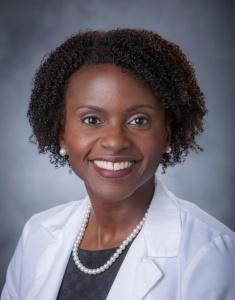
- an interview with Dr. Nia Mitchell
We last interviewed Dr. Mitchell about her research in February 2019, as we celebrated news of her first R01 funding from the NIH National Institute on Aging.
Dr. Mitchell’s clinical trial aims to address an area of health care disparity – an intervention for older African-American women with obesity and frailty in need of weight loss and physical exercise.
But, here’s what happened at Duke and with the study population
On March 13, 2020, Duke University suspended all in-person study activities for non-essential studies until further notice. In mid-March the housing communities where the team planned to conduct the study were forced to close to public visitation by local officials due to the risks associated to Covid-19 and have yet to reopen. Mitchell and team were unable to move forward with plans for in-person recruitment, weekly intervention group meetings, and quarterly study visits to collect outcomes data.
A daunting task
“Initially, although it was a daunting task” says Dr. Mitchell, “we thought we would transition to virtual recruitment, group meetings, and data collection visits. While this would be challenging in most studies, it was going to be more challenging for us because our population was older African American women living in public housing. We thought we would have to provide computers, internet access, and training…in addition to trying to figure out how to collect blood samples and perform physical function tests with minimal in-person contact.”
“We started to worry.”
Mitchell goes on to say that “we contacted a couple of TOPS chapters [TOPS is Take Off pounds Sensibly, a national nonprofit, community based, peer-led weight loss program] whose members were older African American women – one in Durham and one in Denver, CO. Neither one of these chapters, which had been operating for years, chose to go online during the pandemic. We started to worry that we would put in a lot of work setting up our as-yet-to-be-formed chapters with the internet and computers, and they might not want to participate.”
Would the participants themselves accept computer technology?
We decided that it would best to ask potential participants if they would be interested in a virtual intervention where we provided the internet and computers. We also decided to ask about their previous experience with virtual interactions with family, church, and healthcare visits. We will also ask them about any changes in their eating and physical activity habits during the shelter-in-place orders during the pandemic.
How are you transforming to a virtual intervention?
We realized that we needed to get more information from the population we are trying to serve before we plan an intervention in which they may not be able or willing to participate. We plan to conduct a telephone feasibility survey with our population to understand their interest in and barriers to receiving a virtual intervention. The surveys will also tell us how residents are currently coping with the impacts of COVID19. We feel Covid-19 may have been detrimental to older individuals who may rely on others for food, transportation, and social support.
“The pandemic has challenged us to think differently about how we engage research participants and patients in the community. At the same time, it has pushed us to think more creatively about ways we can engage as many people as possible in the work we are doing. Dr. Mitchell’s work is incredibly important. This next phase of her study will undoubtedly not only shed light on how to treat obesity but also how to do this under the changing circumstances of our new world.”
L. Ebony Boulware, MD, MPH
Chief, Division of General Internal Medicine
Associate Vice Chancellor for Translational Research
Vice Dean for Translational Science
Continuing clinical trials ensuring patient and investigator safety, and also maintaining quality data, are of utmost importance. No doubt work such as Mitchell’s will re-envision the future of clinical trials.